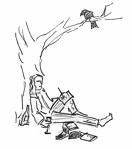What are the basic things you can do to make your poetic-comprehension better?
Here are the few basic things that you can try (some poem forms may have strict formats or overtly regularized rules of syllable count or line count, but considering most poems are written as free verse) –
- You may read the poem’s title but don’t try to articulate your understanding of the poem around it. The poet may have variety of reasons for naming it and the fact that the title appears in the last line or is mostly repeated as a word, isn’t a great one to think so.
- Unless it’s a story running, there’s no beginning, middle and end-it’s not written like that. If there are five stanzas, each one is good enough to understand the intent of the poetry.
- Always try to look for the theme of the poem and try to guess the mood/state-of-wonder of the poet, in which it must have been written. There will always be circumstances that compel and challenge a poet, to sit down and write his verses. What do you think were for this one?
- The most important thing is to understand the comparisons- if the poem is good with metaphors or if the poem is great with simile (because these are the most common & mostly used figure of speeches). If you can get a hang of few comparisons of those many, you can catch the thread of this big-revolving ball, embroiled with thoughts.
- If you can sympathize with the poem, that is good but if you see yourself in the poet’s shoes then it’s a great poem. every poem with an emphatic effect is a master-piece.
- Rhyming schemes are not important, some poems may be structured like normal lines broken at random intervals, some with repetition of ‘ if,when,of’-> to start each line of stanza, some poet’s may obviate the breaking into stanzas and are completely obsessed with the momentum of it, the same way it has hit them while writing it. some poems may be decorated with lot of words that are rhyming together, sweet-sounding homophones, some have lot of commas & semicolon usages. some poets address a change or challenge into the society , they take pride in writing long line verses and repetitions that vociferate their idea. some just concentrate on so many multi-level comparisons, that everything else is forgotten.
Hence, it is not important to understand the rhyming scheme or words usage. As you may see, no poem can have all those attributes, if poem lives on one, it sacrifices the other.
It is important to catch the mental tone, in which the poet has written it. The maximum energy of his skills goes where? Find out?- the figure of speeches, the rhyming scheme, the beginning of the line, the momentum. Etc. it’s reverse-engineering. You try to put yourself in his shoes and you get everything as he has painted. You have your ocular device to view it and discuss your image of his vivid description.
How does a poet sees his poetry?
A poet sees his poetry as an external sense of his physical self. He takes all the bubbles of his emotional and mental thoughts, his innermost turmoil, he mixes them up and present it on paper via his tools. It is now captured into a static medium of observation from a dynamic, ever-evolving chain of thoughts. It has a specific date & time of birth. It can be spread & shared to others ,who will see it and express themselves too. They might be triggered into a similar state of realization. Hence, the poet’s need of expressing his idea is the fascination of its complexity, his spiritual gratification lies in the accomplishment of this task and the open end to the process is the revolution that it has created for others who read it.
What should you never tell a poet about his poem?
- Never tell a poet that he has a great vocabulary and that was an awesome word he used. The poet is already in a life-long struggle with himself to find the correct words, which of-course is a learning process and sometimes a frustrating wild-goose chase. He is more interested in the verbiage of the viewer of that poem (the person whose in the poem’s scene or scenario).
- Never conclude a poem or give a linear opinion. Nobody in the poetic brethren will like it.
- Never lecture a poet to pick the topics or work on diluting the abstract thoughts to reader’s end. Remember! It’s not in his control! He writes what he experiences. If it’s intentional & topics are chosen to cater the reader, quality & purpose of the poem will suffer.
- Don’t give stupid comments that the rhyming is so abab! I like it! Or syllable count is great or its- long or short. These are simply secondary observations. He is more interested in your open-end description or your sympathy/empathy with the state of trance.
- At last, if you can suitably suggest an alternate title to the poem or discuss your opinion about a similar poem. It will be work great at both ends.
Where to start now after reading all of this?
The best place to start is with poems that can appeal. Simply, pick up limericks ( these are usually funny), haiku ( relates to idea of a scene) , general free verse poems of comical genres or poems on sarcasm about everyday’s life situation. It will be easier to start with and you can build your interest and dwell into other complicated work as per you discretion.
Good luck reading poems.
Godspeed.
Vishu mishra


You must be logged in to post a comment.